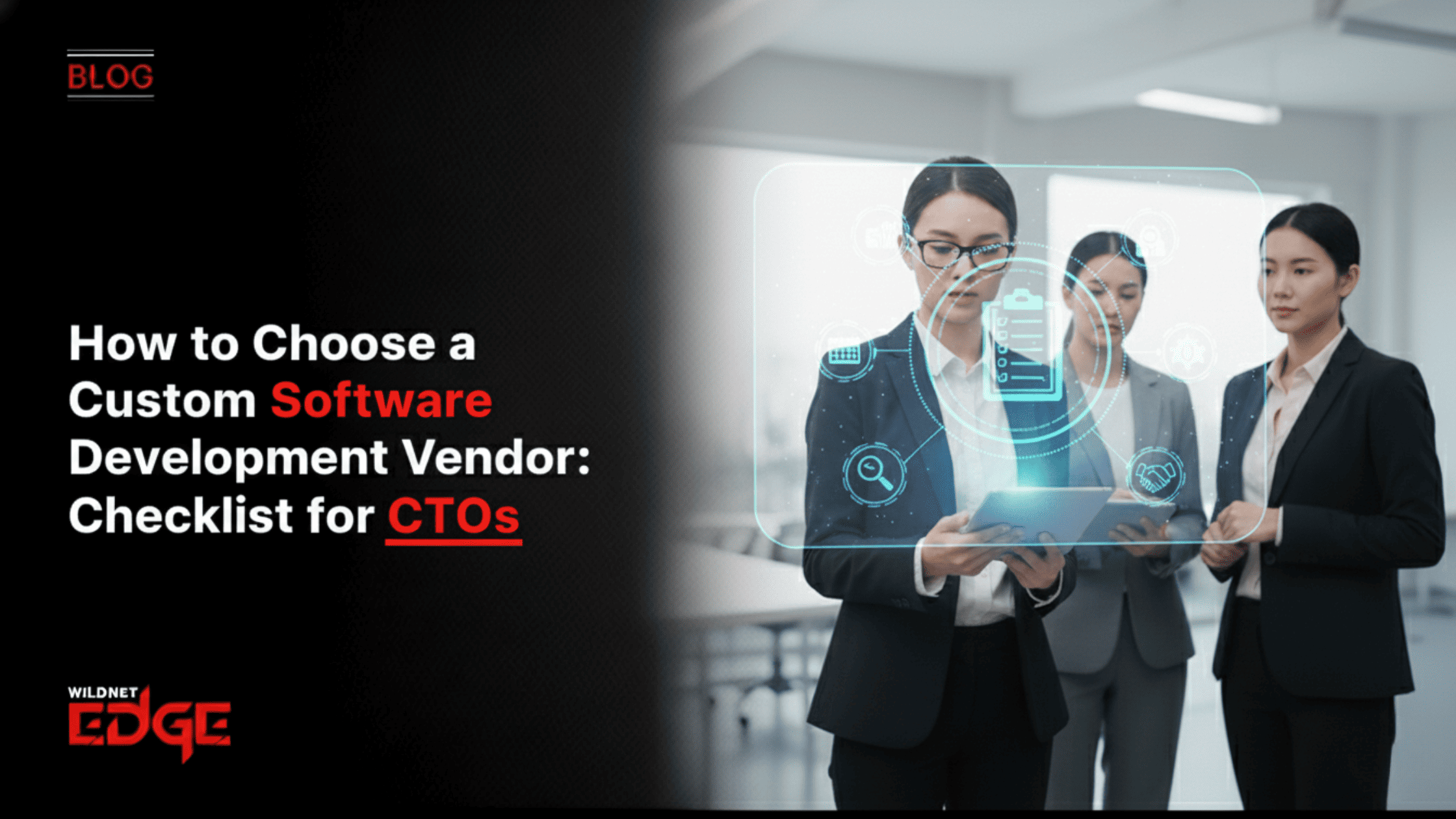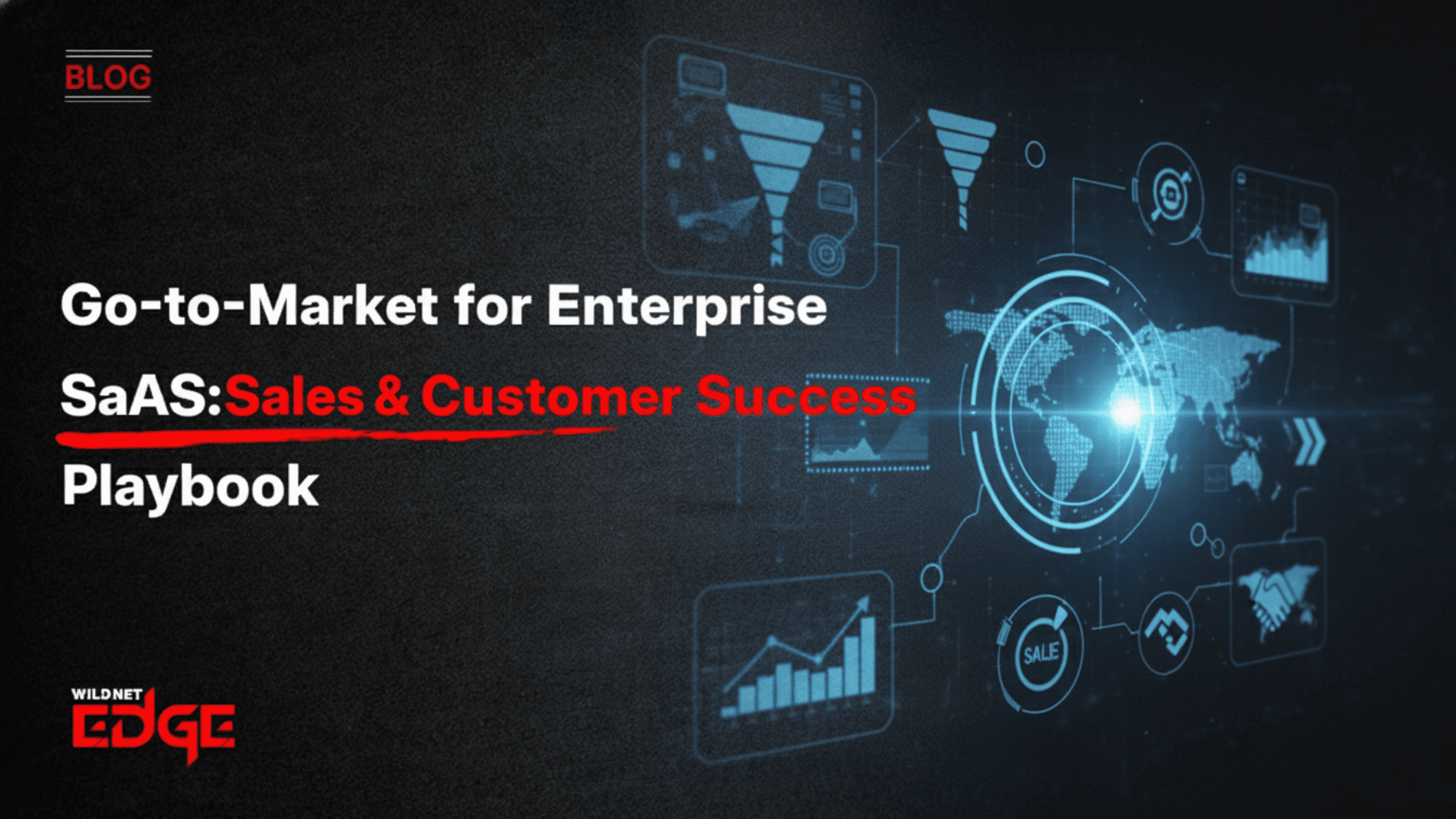TL;DR
This article offers a CTO’s guide to selecting the right vendor for custom software development. It highlights how the right partner directly impacts quality, cost, and timelines. The guide covers key evaluation criteria, technical expertise, Agile and DevOps practices, security standards, and communication efficiency while comparing partnership models and outlining due diligence steps. It emphasises that a strategic vendor selection process is vital for reducing risks and ensuring alignment with enterprise goals.
As a Chief Technology Officer, one of your most critical responsibilities is selecting the right partners to build your company’s strategic software assets. When embarking on a custom software project, the choice of your development vendor can be the single most significant factor determining success or failure. It impacts everything from code quality and scalability to budget adherence and time-to-market. A methodical approach to vendor selection custom software development is not just good practice; it’s essential for mitigating risk and maximising the return on your significant technology investment.
Why Strategic Vendor Selection is Paramount
Choosing the wrong vendor can lead to disastrous consequences: missed deadlines, budget overruns, poor quality code, security vulnerabilities and a final product that doesn’t meet business needs. The wrong partner can cost you far more than just money; they can cost you market opportunity and competitive advantage.
Consequently, the best custom software company for your needs becomes a true strategic partner. They bring not only technical expertise but also industry insights, process maturity, and a commitment to your long-term success. Effective vendor selection custom software involves finding a partner who aligns with your technical vision, operational realities, and company culture.
The Core Vendor Selection Criteria: A CTO’s Checklist
When evaluating potential partners, CTOs need to look beyond the sales pitch and assess fundamental capabilities. This enterprise vendor checklist covers the essentials.
1. Proven Technical Expertise and Relevant Experience
Does the vendor have deep expertise in the specific technologies required for your project? Do they have significant experience building similar applications, e.g., complex enterprise systems, high-traffic consumer apps or working within your industry? Ask for specific case studies and technical deep dives.
2. Mature Development Process and Methodology
How do they actually build software? Look for a vendor with a well-defined, mature process, typically based on Agile methodologies. Do they have strong practices for requirements gathering, project management, code reviews, and quality assurance? Do they embrace DevOps principles for automation and efficient deployment? A mature process minimises risk and ensures predictability. Understanding their approach, including how they handle prototype-to-product transition support, can reveal their agility and focus on long-term value.
3. Communication, Collaboration, and Transparency
How will the vendor communicate progress, challenges, and risks? Look for clear communication protocols, regular status updates, and direct access to the development team. Are they transparent about their process and willing to collaborate closely with your internal stakeholders? Cultural fit and communication style are critical for a smooth partnership.
4. Security and Compliance Posture
Security cannot be an afterthought. Does the vendor follow secure app development practices like OWASP Top 10? Do they have experience building applications that meet relevant compliance standards, e.g., GDPR, HIPAA, SOC 2 ? Verify their processes for security testing, vulnerability management, and data protection. This is vital for startup data security and enterprise systems alike.
5. Scalability and Long-Term Partnership Potential
Does the vendor build scalable software solutions designed for future growth? Equally important, do you see them as a long-term partner? Custom software requires ongoing maintenance and evolution. Choose a vendor you trust to support the application long after the initial launch. Evaluate different enterprise software partnership models they offer of continuing support.
The Vendor Selection Process: A Step-by-Step Approach
A structured process helps ensure an objective and thorough evaluation when choosing software development partner.
- Define Requirements Clearly: Before you even look for vendors, document your project goals, scope, technical requirements, and budget constraints in a detailed Request for Proposal or project brief.
- Research and Shortlist Vendors: Identify potential partners through online research, referrals, and industry directories. Look for companies matching your technical needs and industry focus. Create a shortlist of 3-5 promising candidates.
- Issue RFP and Evaluate Proposals: Send your RFP to the shortlisted vendors. Carefully evaluate their proposals not just on price, but on their understanding of your project, their proposed technical solution, team composition, and process description.
- Conduct Interviews and Technical Due Diligence: Interview the key personnel who would be assigned to your project like Project Manager, Tech Lead. Ask deep technical questions to validate their expertise. Request code samples or architectural diagrams if appropriate.
- Check References Thoroughly: Speak directly with 2-3 previous clients, ideally those with projects similar in scope and complexity to yours. Ask detailed questions about their experience, communication, quality, and ability to meet deadlines.
- Make the Final Decision: Weigh all factors technical competence, process, communication, cost, and references to select the partner that best aligns with your strategic needs.
Common Mistakes to Avoid in Vendor Selection
- Choosing Solely on Price: The cheapest option is rarely the best value. Poor quality or project delays from a low-cost vendor often cost more in the long run.
- Ignoring Cultural Fit: A vendor whose communication style or work culture clashes with yours will create friction and frustration.
- Not Checking References: Skipping this step is a major red flag. References provide invaluable, unbiased insights.
- Poorly Defined Scope: Giving vendors a vague project description will result in inaccurate proposals and likely project failure. Invest time in defining requirements upfront.
- Focusing Only on Sales Pitches: Talk to the technical leads and project managers who would work on your project, not just the sales team.
Our Enterprise Partnership Approach: Case Studies
Case Study 1: A Logistics Firm’s ERP Modernisation
- The Challenge: A large logistics company needed to replace its ageing, custom-built ERP system. The project was massive, complex, and business-critical. Choosing the right long-term partner was paramount.
- Our Solution: After a rigorous vendor selection custom software process, they chose us based on our deep expertise in logistics and our proven agile methodology. We collaborated closely with their internal teams through an extensive discovery phase before beginning phased development. We provided specialized ERP customization services.
- The Result: We successfully delivered the multi-year project in phases, ensuring minimal disruption to their operations. The modern, scalable ERP transformed their efficiency and provided the foundation for future innovation. The client cited our transparent communication and collaborative approach as key success factors.
Case Study 2: A SaaS Provider’s Platform Scale-Up
- The Challenge: A successful SaaS company needed to rapidly scale its platform architecture to handle exponential user growth, but lacked the specific high-level cloud architecture expertise in-house.
- Our Solution: They augmented their internal team by partnering with our specialised DevOps and backend engineers. We provided targeted expertise to re-architect key components for cross-platform scalability and implement a robust CI/CD pipeline. This project involved outsourced SaaS application development.
- The Result: The platform successfully scaled to support a 10x increase in user load without performance degradation. The partnership allowed them to leverage specialized skills exactly when needed, accelerating their growth trajectory significantly.
Our Technology Expertise
We offer deep expertise across modern technology stacks suitable for enterprise needs.
- Backend: .NET, Java, Python, Node.js
- Frontend: Angular, React, Vue.js
- Cloud Platforms: Microsoft Azure, AWS, Google Cloud
- Databases: Microsoft SQL Server, PostgreSQL, Oracle, MongoDB, Cosmos DB
- DevOps & Automation: Azure DevOps, Jenkins, Kubernetes, Terraform
Conclusion
Selecting the right partner for custom software development services is one of the most impactful decisions a CTO can make. It requires a strategic, diligent approach that goes beyond comparing hourly rates. By focusing on proven expertise, mature processes, transparent communication, and a strong cultural fit, you can find a software development agency that acts as a valid extension of your team, enabling you to build the innovative enterprise software solutions that drive your business forward.
Ready to find a partner who understands your enterprise needs? At Wildnet Edge, our AI-first approach ensures we build intelligent, scalable, and secure software. We offer various engagement models, including dedicated teams and project-based work, providing the flexibility and expertise required for successful enterprise software development.
FAQs
While all criteria are essential, proven technical expertise relevant to your specific project type and strong, transparent communication are often the two most critical factors for ensuring a successful outcome in vendor selection for custom software.
Location impacts cost and potentially time zone overlap for communication. Offshore vendors often offer significant cost savings, but require mature communication processes. Onshore offers easier collaboration but at a higher price. Evaluate based on your budget and your team’s ability to manage remote cooperation effectively.
The methodology dictates how the project will be managed, how requirements are handled, and how often you see progress. Agile methods are generally preferred for complex custom software as they allow for flexibility, iteration, and continuous feedback, reducing the risk of building the wrong product.
Look closely at what’s included. Does the price cover discovery, design, development, QA, project management, and deployment? Are there assumptions or exclusions? A detailed proposal breakdown is essential. Sometimes a higher price reflects a more thorough process or more senior talent, which can be a better value.
Red flags include vague proposals, an inability to provide relevant case studies or client references, overly optimistic timelines, a lack of transparency about their team or process, and poor communication during the sales process itself.
For critical projects, yes. While NDAs might prevent them from sharing actual client code, they should be able to provide sample projects or demonstrate their coding standards and architectural approach through anonymised examples or technical discussions.
Very important. Custom software requires ongoing maintenance, bug fixes, and potentially future enhancements. Ensure the vendor offers flexible and reliable post-launch support options that fit your long-term needs. This should be part of the discussion around different partnership models.

Nitin Agarwal is a veteran in custom software development. He is fascinated by how software can turn ideas into real-world solutions. With extensive experience designing scalable and efficient systems, he focuses on creating software that delivers tangible results. Nitin enjoys exploring emerging technologies, taking on challenging projects, and mentoring teams to bring ideas to life. He believes that good software is not just about code; it’s about understanding problems and creating value for users. For him, great software combines thoughtful design, clever engineering, and a clear understanding of the problems it’s meant to solve.
 sales@wildnetedge.com
sales@wildnetedge.com +1 (212) 901 8616
+1 (212) 901 8616 +1 (437) 225-7733
+1 (437) 225-7733















 ChatGPT Development & Enablement
ChatGPT Development & Enablement Hire AI & ChatGPT Experts
Hire AI & ChatGPT Experts ChatGPT Apps by Industry
ChatGPT Apps by Industry ChatGPT Blog
ChatGPT Blog ChatGPT Case study
ChatGPT Case study AI Development Services
AI Development Services Industry AI Solutions
Industry AI Solutions AI Consulting & Research
AI Consulting & Research Automation & Intelligence
Automation & Intelligence















